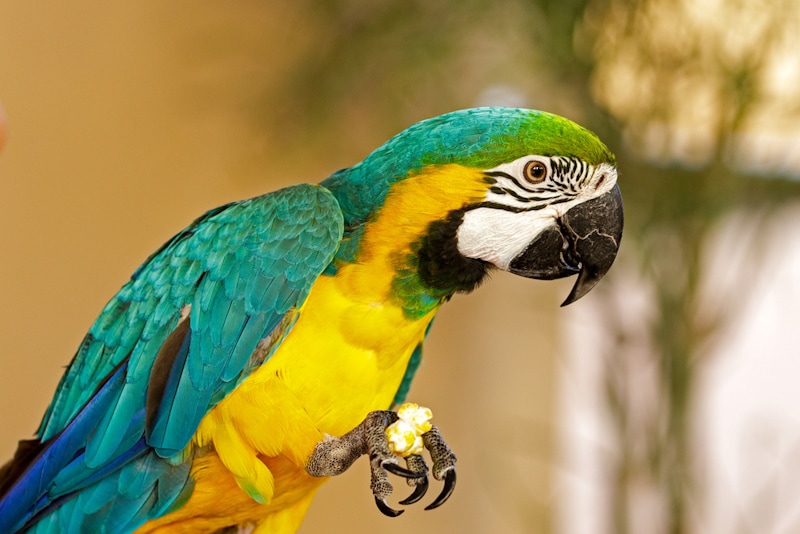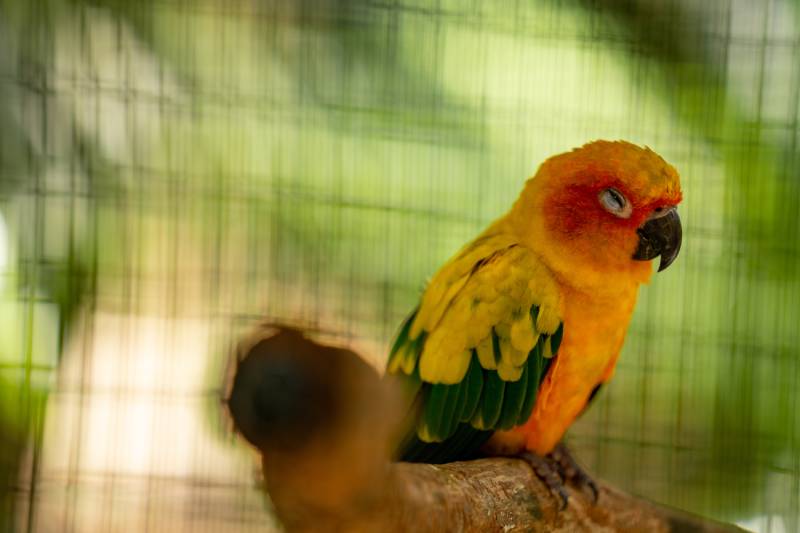Can Parrots Eat Popcorn? Vet-Reviewed Health Considerations
By Ashley Bates
Updated on

Click to Skip Ahead
Our parrots can delight in quite a few items our kitchen has to offer. These animals can feast on vegetables, fruit, nuts, and seeds alongside us. Because you already likely know the basics of what to feed your parrot, you might be looking at other options—like popcorn.
So, when it comes to popcorn, is it parrot-safe? If you have a few plain, popped pieces and you feel like sharing, popcorn can be very parrot-friendly—but there are some considerations and important factors that can pose risks. Let’s learn!
Parrots Can Have Popcorn
Popcorn consists of fluffed-up corn kernels. While they can be packed with any topping of your choosing, you should only serve the plain variety to your feathered friends. This means no salt, butter, flavorings, or sweeteners. Popcorn should also be popped, not in the kernel form. Unpopped kernels can be a choking hazard for some parrots.
Your parrot’s normal diet should consist of 70-80% of a commercial pellet formulated for parrots. The other 20-30% can be a combination of fresh vegetables, fruits, nuts, and seeds. This is where popcorn fits in, it should be used as an occasional snack, not a dietary staple.

Benefits of Popcorn for Parrots
There are several perks of popcorn for parrots. Granted, you must integrate popcorn as an occasional snack and not an everyday meal for your parrot.
- Fiber: Birds have a very high-fiber diet in general. Popcorn is yet another food source that provides a decent amount of fiber into their diet. Adequate fiber aids in food movement through the digestive tract to prevent constipation.
- Phenolic Acid: Phenolic acids are natural antioxidants found in popcorn. These antioxidants may be able to help with preventing bacteria infections and fighting inflammation.
- Niacin: Niacin, otherwise known as vitamin B3, helps the body turn food into energy.
- Riboflavin: Riboflavin is involved with energy production and breaking down fats in the body.
- Thiamin: Thiamin, or vitamin B1, helps transform carbohydrates into energy and promote nervous system health.
- Phosphorus: Phosphorus helps with bone growth and repair.
- Magnesium: Magnesium is a very important mineral that helps the body create healthy nerves, muscles, and blood sugar levels.
- Zinc: Zinc helps with repairing damaged tissue and boosting the immune system.
The 5 Potential Dangers of Popcorn for Parrots
You should always avoid any additives on popcorn—salt, butter, garlic, etc. These ingredients are not only unhealthy for your parrot, but they can be dangerous.
1. Hulls
As you feed your bird popcorn, remove any hulls. Even though your bird is a master at cracking and eating seeds, we wouldn’t want to create a choking hazard where there should not be one.

2. Butter
Butter isn’t necessarily toxic for parrots, but it isn’t good for them either. While small amounts may not cause any problems, eating lots of butter can lead to digestive problems, and the extra calories may cause weight gain.
3. Salt
Salt is another no-no ingredient in popcorn. Like us, parrots need salt in their diet. However, they don’t need any extra salt besides what is in their pellets. If they have too much or too little salt intake, it can throw off the electrolyte balance in their body and cause significant health issues.
Too much salt can lead to excessive thirst, dehydration, and even kidney failure.
4. Processed Popcorn
Stay completely clear of any processed popcorn. Birds can be very sensitive to a number of chemicals, artificial preservatives, dyes, and flavors. Pre-popped bags of popcorn will likely have at least one of these components. Instead, choose an all-natural, plain popcorn to prepare at home for your pet.
5. Seasonings
We’ve stated it once, and we’ll state it again: always serve plain popcorn with no additional seasonings. Any additional additives you buy at the store may likely have food dyes, preservatives, and a laundry list of other potentially harmful chemicals.

Conclusion
So now you understand that popcorn can be a healthy snack for your parrot. It contains many valuable vitamins and minerals. Plus, it’s super yummy for your birdie to enjoy!
Remember that you should only feed completely plain air-popped popcorn to eliminate the risk of gastrointestinal upset and toxicity, and keep popcorn as an occasional snack instead of an everyday food.
Featured Image Credit: Georgia Vagim, Unsplash












